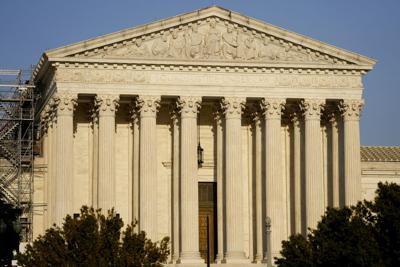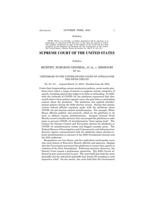WASHINGTON – The U.S. Supreme Court on Wednesday rejected Louisiana's claims that the Biden administration violated the First Amendment by trying to squash controversial opinions about COVID vaccinations and other conservative views on Facebook, X, YouTube and other social media platforms.
The 6-3 majority found that Louisiana, Missouri and five individuals failed to show that removing or placing warning labels on the posts was the result of government interference rather than the application of private policies by the social media companies for moderating content.
Associate Justice Amy Coney Barrett, who grew up in Metairie, wrote the decision for the majority. She was nominated by President Donald Trump. Barrett was joined by Chief Justice John Roberts and Associate Justices Sonia Sotomayor, Elena Kagan and Brett Kavanaugh.
U.S. Supreme Court on 6-3 vote, rejects Louisiana claim that Biden censured conservative views in social media
For instance, Barrett wrote, one person who was part of the Louisiana and Missouri action was Jill Hines, who lived in Metairie when she cofounded Health Freedom Louisiana. Hines claims her Facebook account was suspended and her posts removed because of her organization’s views on vaccine and mask mandates.
Barrett noted that Facebook started targeting the content of Hines’ posts “before almost all of its communications with the White House and the CDC (the federal Centers for Disease Control and Prevention in Atlanta), thus weakening the inference that her subsequent restrictions are likely traceable to government-coerced enforcement.”
Facebook, in late 2019, unveiled measures to counter foreign election interference campaigns and voter suppression efforts. In 2020, Facebook asked the CDC for authoritative information about the COVID-19 virus that it could post. In February 2021, Facebook expanded its COVID-19 misinformation policies, “before White House officials began communicating with the platform,” the ruling states.
Writing for the three justices who opposed the majority’s decision, Associate Justice Samuel Alito argued that White House pressure was enough.
“What the Court seems to want are a series of ironclad links — from a particular coercive communication to a particular change in Facebook's rules or practice and then to a particular adverse action against Hines,” Alito wrote.
Alito, nominated by President George W. Bush, was joined by Associate Justices Clarence Thomas and Neal M. Gorsuch.
Louisiana Attorney General Liz Murrill agreed with Alito.
"A majority of the Supreme Court gives a free pass to the federal government to threaten tech platforms into censorship and suppression of speech that is indisputably protected by the First Amendment," she said after the ruling. "The majority waves off the worst government coercion scheme in history."
It was the high court’s first effort to address how government can release information in the emerging digital media atmosphere, which has billions of active users, and what efforts the government can take to moderate content in social media without censoring free speech.
In December 2021, some Republican Louisiana legislators were working to block then-Democratic Gov. Gov. John Bel Edwards and his health department efforts to vaccinate school children against COVID-19.
In May 2022, Louisiana Gov. Jeff Landry and Missouri U.S. Sen. Eric Schmitt, who at the time were both Republican attorneys general in their states, claimed in their lawsuit — eventually named Murthy v. Missouri — that federal government officials were “coercing” social media companies to squelch content on platforms, such as Facebook and Twitter.
Landry, Schmitt and several website owners accused the Biden administration of targeting conservative speech to tamp down posts about the safety of COVID-19 vaccines and where the virus originated, as well as other contentious claims and topics, such as fraud in the 2020 presidential election and the content on a laptop owned by Hunter Biden, the president’s son.
A lower court judge in Monroe, U.S. District Judge Terry A. Doughty, nominated by President Donald Trump, last summer blocked government officials from communications that would lead to the suppression of “content containing protected free speech.” He said the evidence of such government interference was “substantial” and “depicts an almost dystopian scenario” in which the U.S. government “seems to have assumed a role similar to an Orwellian ‘Ministry of Truth.’”
Doughty’s sweeping order banned most government employees from contacting social media platforms at all.
U.S. Surgeon General Vivek Murthy and the Biden administration countered that its officials had pointed out misinformation, much the same way as politicians have historically done about news stories with which they don’t agree. The social media companies were left to decide how to handle the posts, the Biden administration claimed.
In addition, Murthy argued the First Amendment doesn’t limit the government from participating in debate and presenting information.
The Biden administration, along with civil rights groups and about 20 states, argued that the sweeping injunction would chill efforts by the government to pass along to the public vital information on security, health care and other important subjects.
A three-judge 5th U.S. Circuit Court of Appeals panel vacated much of the lower court order but did find that some government officials had violated First Amendment provisions with threats and expressions that amounted to censorship. The New Orleans-based appellate court allowed most of the thousands of federal employees to communicate with social media companies but limited contact from members of the White House and several government agencies, including Murthy’s office.
The Supreme Court suspended the injunction in October and decided to hear the case.
The majority determined Wednesday that the 5th Circuit “glossed over complexities in the evidence” and reversed the appellate court's ruling.


